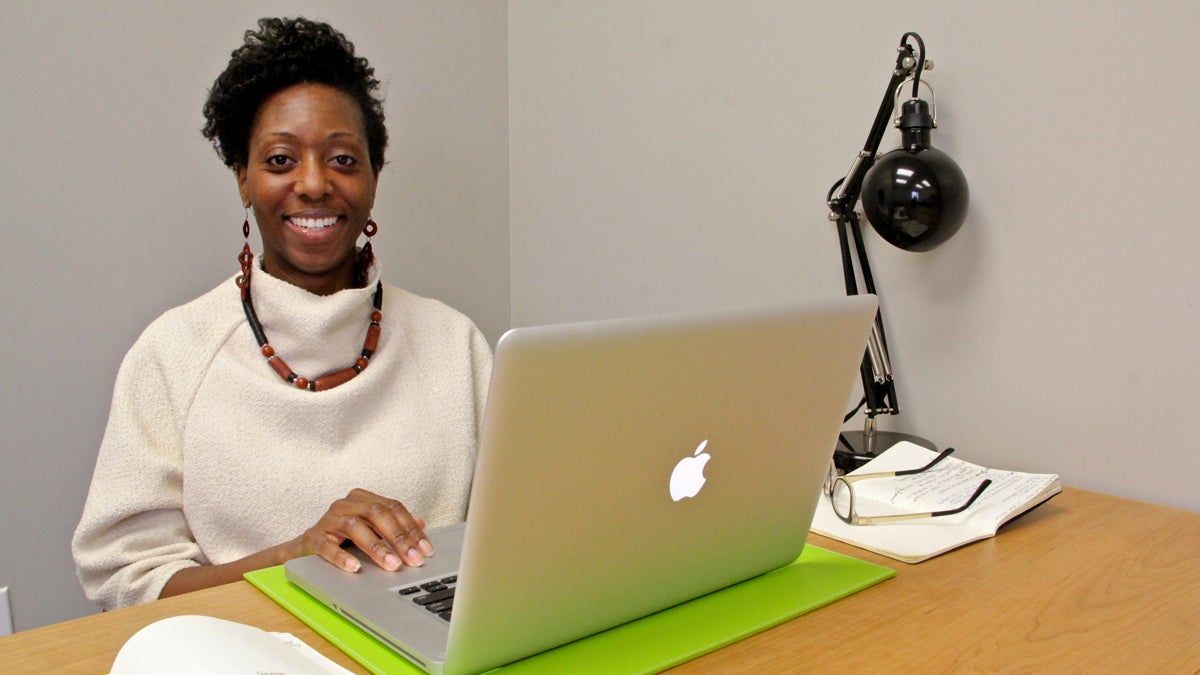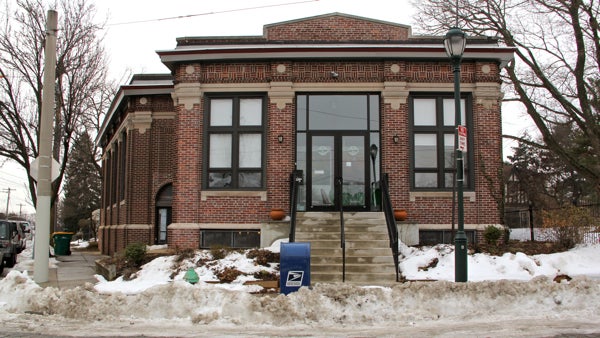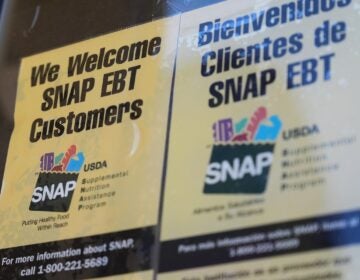Hub to encourage immigrants, trigger innovation opens its doors in Mt. Airy
Listen
Consultant Melissa Howell makes use of a workspace at the Immigration Innovation Hub at Mt. Airy USA. (Emma Lee/WHYY)
Philadelphia’s population has been on the rise in recent years — thanks, in part, to new immigrants — and one Philadelphia neighborhood is hoping to capitalize on this influx of newcomers by giving their businesses a boost.
On Thursday evening, a group of nonprofits will launch the “Philadelphia Immigrant Innovation Hub” on the site of a former post office on Germantown Ave. in Mt. Airy. The idea — backed by a $261,500 grant from the Knight Foundation — is to give immigrant entrepreneurs space to work; one-on-one coaching to beef up their business plans; and access to loans to grow their operations for a period of about 18 months. Some of the entrepreneurs have been in business for a while and are struggling, while others just have an idea.
“The heart of it is really trying to give folks individualized, specialized attention to help them move their particular plan forward,” said Brad Copeland, executive director of the community development corporation, Mount Airy, U.S.A. The organization is partnering with the Welcoming Center for New Pennsylvanians, which is providing technical assistance workshops. Finanta, a nonprofit lending corporation based in Philadelphia, is a third partner that is focusing on helping the entrepreneurs establish or build credit and access loans many of them would not receive from a traditional bank.
That sustained individual attention is what makes this different from other city programs, said Herman Nyamunga, who directs small business development efforts at the Welcoming Center.
“What you find with most immigrants, their businesses are shaky,” said Nyamunga. “They stagnate, they don’t grow because they’re starting from a very weak foundation. We are helping them to get that foundation right.”
 The new home of the Immigration Immigration Hub opens Thursday at 6700 Germantown Ave. in Mt. Airy. (Emma Lee/WHYY)
The new home of the Immigration Immigration Hub opens Thursday at 6700 Germantown Ave. in Mt. Airy. (Emma Lee/WHYY)
Eric Nzeribe started Funtimes Magazine back in the early ’90s in his native Liberia to help people cope in a country racked by the violence and starvation of civil war. He brought Funtimes with him when he immigrated to Philadelphia in 2000, but he soon found out the magazine business is different here.
“When we printed in Africa, we had vendors that would come and pick up the magazines and go to offices and drop them off and collect the money,” Nzeribe said. “They did the distribution.”
In the U.S., that’s a whole separate industry. And in the 16 years he’s been here, his audience has changed from people in Africa to African and Caribbean immigrants, as well as African-Americans interested in how those immigrants are living here, so the content and mission of the publication is shifting, too.
Nzeribe’s mentors at the hub are helping him go back to the “fundamentals,” figuring out the optimal distribution process and giving him the opportunity to do market research to — as he puts it — get more “eyeballs” for his magazine.
“There is this is saying that the teacher appears when the student is ready, so Philly hub is one of those things that you encounter when you are ready,” he said. “And we hope that it will push us to the marketing level that we want, to the distribution that we want, some of those milestones that will truly make us a player in this region.”
He hopes to more than double his “eyeballs” from 29,000 to as many as 70,000.
So why is Nzeribe getting all this help? Copeland said the goal is to encourage people like Nzeribe to eventually move their businesses to Mt. Airy, a neighborhood that already has a reputation for embracing diversity .
“The energy and the creativity that immigrant entrepreneurs can contribute to what is already a creative and innovative community I think is why we’re here,” he said.
The hub is already working with 20 immigrant entrepreneurs and the groups hope to get at least 60 people on board in the first year and a half.
Melissa Howell, who runs a consulting firm to help nonprofits design programs to deal with pressing social issues, was part of the first cohort of 10 that started in November. She immigrated to Miami from London when she was a child and her parents are Carribbean immigrants.
Howell started the business while she was still living in New York City after she was unable to find full-time work after completing a graduate program that wrapped up during the recession. However, she has had difficulty clearly defining the firm’s mission and since moving to Philadephia, has not attracted any local clients.
“A misunderstanding… is that it’s easy to come to a new community or a new country, inform yourself of everything you need to know without a network of people to support you and educate you on navigating the local economy and local government,” she said. “You really aren’t set up for success.”
She feels differently at the hub.
“It’s been much more than I expected,” she said. “The one-on-one coaching has really been phenomenal for me, just really being able to sit down and talk to someone whose experience is supporting businesses… at all stages, helping me to think about why my firm exists… and reminding me of my vision.”
WHYY is your source for fact-based, in-depth journalism and information. As a nonprofit organization, we rely on financial support from readers like you. Please give today.




